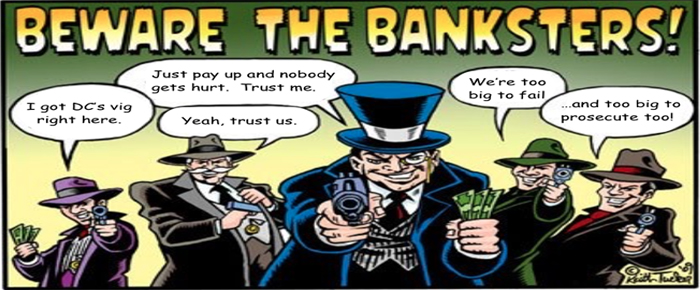
By Haddon Libby
In recent years, the Department of Justice has instigated 144 cases against financial institutions like Wells Fargo Bank. These cases have led to more than $250 billion in fines yet no one has gone to jail. While the financial firms have had to fire some people, most firms have continued in a business-as-usual manner after each case.
Bank of America has paid the most in fines at $120 billion (and counting) with Chase, Citibank, UBS, Wells Fargo, BNP-Bank of the West and Deutsche Bank all paying more than $10 billion in fines each.
While you would think that the huge fines associated with these cases would have led to a change of behavior, it appears that the lack of personal culpability by those managing these financial edifices has emboldened a number of them to behave like banksters (a word mash-up of banker and gangster). Given the financial gains that these ‘leaders’ of too-large-to-prosecute firms can make, the fines and penalties seem to be viewed as the business equivalent to a speeding ticket.
The most recent case of financial abuse and fraud comes from Wells Fargo where 2% of their employees opened 2 million accounts without customer knowledge. While low level employees were fired, no one in executive management was fired. The person running the units responsible for the massive fraud, Carrie Tolstedt, will retire this year with as much as $125 million in payments while John Stumpf, the CEO, is schedule to make $200 million when he is ultimately forced to resign as a result of the bank’s atrocious behavior. The bank will earn nearly $30 billion in profits this year despite all of this. While deposit and credit card account fraud is the most talked about example of bad behavior at Wells Fargo, they have also paid large fines for the way they have treated military members, the elderly, students, delinquent homeowners and, well, pretty much anyone else who did business with the bank.
Wells Fargo is not the only financial institution to behave in a fashion that would land you or me in jail. Let’s look at a few of the cases of bad behavior by the financial firms that have business operations here in the Coachella Valley:
Bank of California: Forced to close their prepaid card operations that were located here in the Coachella Valley for alleged money laundering efforts for the Mexican drug cartels.
BNP-Bank of the West: Paid $8.9 billion for money laundering activities.
Chase: Paid $2 billion in fines for not reporting Bernie Madoff’s suspicious activities. Chase is currently facing investigations both here and abroad over their hiring practices where they traded jobs and tuition payments for business from foreign governments.
Citibank: Helped Mexican drug cartels in laundering hundreds of millions via complex structures meant to hide the source of the monies.
Edward Jones: Overcharged buyers of new municipal bonds offerings.
JP Morgan/Chase: Paid a $307 million fine for not disclosing their conflicts of interest when managing the investments of their clients. JP Morgan would choose firm-managed mutual funds over better performing, less expensive options.
Merrill Lynch: Misused customer cash and failed to safeguard customer assets from the claims of their creditors from 2009-2015. If Merrill Lynch were to have failed, a clients’ investment account could have been lost. With these billions in customer funds, Merrill Lynch invested the monies and made a tidy sum. Merrill Lynch paid a $415 million fine.
Raymond James: Failed to comply with anti-money laundering regulations. The firm paid $17 million in fines and their chief compliance officer was banned from the industry for 90 days.
To check on the firms and people that you do business on, try searching these websites: finra.org, fbi.gov and justice.gov.
Haddon Libby is a Financial Advisor and Managing Director for Winslow Drake and can be reached at HLibby@WinslowDrake.com or 760.449.6349.












































